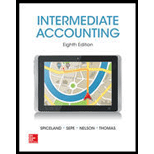
Generally Accepted Accounting Principles (GAAP):
Generally Accepted Accounting Principles are the generally followed rules, concepts and principles which are used for the presentation of the financial information of a business organization.
International Financial Reporting Standards (IFRS):
International Financial Reporting Standards is a set of accounting standards which are developed by independent (Non-profit) organization called as International Accounting Standards Board (IASB). It is universally accepted set of standards which states the rules and practice for accounting practice.
To Identify: Any differences between Generally Accepted
Want to see the full answer?
Check out a sample textbook solution
Chapter 10 Solutions
Intermediate Accounting w/ Annual Report; Connect Access Card
- Nonearrow_forwardIndira Products has provided the following data for the month of August: a. The balance in the Finished Goods inventory account at the beginning of the month was $65,000 and at the end of the month was $29,500. b. The cost of goods manufactured for the month was $210,000. c. The actual manufacturing overhead cost incurred was $71,800 and the manufacturing overhead cost applied to Work in Process was $75,200. d. The company closes out any underapplied or overapplied manufacturing overhead to the cost of goods sold. What is the adjusted cost of goods sold that would appear on the income statement for August?arrow_forwardLand should be capitalized at what amountarrow_forward
- Delta Tools estimated its manufacturing overhead for the year to be $875,500. At the end of the year, actual direct labor hours were 49,600 hours, and the actual manufacturing overhead was $948,000. Manufacturing overhead for the year was overapplied by $81,400. If the predetermined overhead rate is based on direct labor hours, then the estimated direct labor hours at the beginning of the year used in the predetermined overhead rate must have been _.arrow_forwardWhat is the depreciation expense for 2022arrow_forwardCan you solve this financial accounting question with the appropriate financial analysis techniques?arrow_forward
- Julius provided consulting services amounting to P420, 000. His total expenses were 25%. His net income is: A. P105,000 B. P300,000 C. P315,000 D. P120,000arrow_forwardWhat is the cost of goods soldarrow_forwardSnapGallery Inc. sells one digital poster frame. The sales price per unit is $12. The variable cost per unit is $7. Fixed costs per annum are $13,500 and having a sales volume of 5,000 digital poster frames would result in: 1. a profit of $11,500 2. a loss of $2,500 3. breaking even 4. a profit of $8,000arrow_forward



